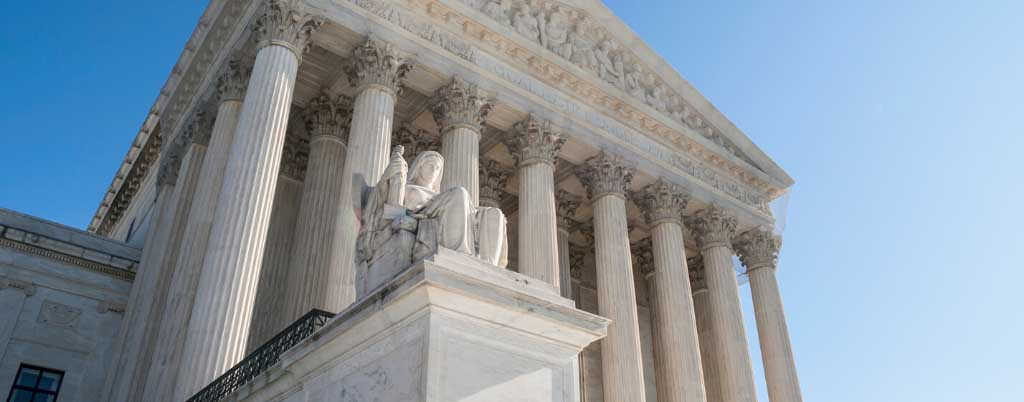

SCOTUS accepts new cases, issues opinions
Spring is a busy time for the U.S. Supreme Court (SCOTUS). I thought it would be timely to bring you an update on what’s been happening. Here’s a sampling of recent SCOTUS activity.
SCOTUS heard its final oral arguments of the 2020-2021 term on May 4, and since, it has been busy issuing decisions and accepting cases for its 2021-2022 term, which is scheduled to begin Oct. 4.
- In a unanimous opinion, the court reversed the 9th Circuit’s ruling in United States v. Palomar-Santiago on May 24 and remanded the case for further proceedings. The case concerned removable offenses and the validity of removal orders under federal immigration law.
The court held that each of the statutory requirements of §1326(d) were mandatory.
- In a unanimous opinion, the court reversed the U.S. Court of Appeals for the D.C. Circuit’s ruling in Guam v. United States on May 24 and remanded the case for further proceedings. The case concerned Comprehensive Environmental Response, Compensation, and Liability Act (CERCLA) claims. The court held that a CERCLA contribution requires resolution of a CERCLA-specific liability.
- The court dismissed American Medical Association v. Becerra in its order list published on May 17. The case concerned whether the U.S. Department of Health and Human Services violated the Administrative Procedure Act and federal healthcare laws when it issued a 2019 rule that placed abortion-related restrictions on healthcare providers receiving federal funds under a Title X family planning program.
- The court’s order dismissing the case stated that the Joe Biden (D) administration had filed a letter saying that it would enforce the challenged regulations outside the state of Maryland while it worked through the notice and comment rulemaking process to override them. The administration said it aimed to have a new final rule published early in the fall of 2021 so that it could go into effect before the 2022 Title X funding announcement.
- On May 17, the court ruled unanimously in CIC Services v. Internal Revenue Service that CIC Services, a risk management consulting firm, may challenge an IRS records reporting regulation without first violating the new regulation and paying a tax penalty. At issue was whether the Anti-Injunction Act, a federal law that bars lawsuits to prevent the assessment or collection of taxes, blocked CIC’s challenge.
- On May 17, the court agreed to hear three more cases during its 2021-2022 term. That brought the total the court has agreed to hear next term to 17.
- Dobbs v. Jackson Women’s Health Organization concerns the constitutionality of a Mississippi state law prohibiting abortions after the 15th week of pregnancy except in cases of medical emergencies or fetal abnormalities.
- Shinn v. Ramirez concerns the scope of evidence a federal appellate court can consider when reviewing a petition for habeas relief.
- Badgerow v. Walters concerns the federal courts’ jurisdiction to confirm or vacate an arbitration award under the Federal Arbitration Act.
The court agreed to hear 62 cases during its 2020-2021 term and had issued opinions in 38 cases as of May 24. Seven cases were decided without argument. Between the 2007 and 2019 terms, SCOTUS released opinions in 991 cases, averaging 76 cases per year.
Gov. Greg Abbott sets runoff in Texas’ 6th Congressional District for July 27
Here’s an update on the special election for Texas’ 6th Congressional District.
Texas Gov. Greg Abbott (R) announced that the special runoff election to fill the vacancy in Texas’ 6th District will take place on July 27, 2021. The two candidates in the runoff are Jake Ellzey (R) and Susan Wright (R). Since they are both Republicans, the seat will not change party hands as a result of the election.
Ellzey and Wright advanced from a 23-candidate special election on May 1. Wright received 19.2% of the vote while Ellzey received 13.8% of the vote. Jana Lynne Sanchez (D), the Democratic candidate to receive the most votes, received 13.4% of the vote. She missed qualifying for the runoff by 354 votes.
The previous incumbent, Ronald Wright (R), died from COVID-19 related complications on February 7, 2021. Susan Wright is Ronald Wright’s widow. Former President Donald Trump (R) endorsed her on April 26.
Five special congressional elections have been scheduled for this year so far. Two others—both in Louisiana—have passed. There were 10 special congressional elections to the 116th Congress and 17 special elections to the 115th Congress.
Lori McCann appointed to the Idaho House of Representatives
Speaking of filling vacancies, here’s an update from state legislatures. Governor Brad Little (R) appointed Lori McCann (R) on May 17 to represent District 6A in the Idaho House of Representatives. The seat has been vacant since April 29, when former state Rep. Aaron von Ehlinger (R) resigned.
As of May 20, there have been 48 state legislative vacancies in 28 states so far this year. Thirty-one (31) of those vacancies have been filled. McCann is one of 15 Republicans to fill state legislative vacancies this year.
In 2020, there were 146 state legislative vacancies in 42 states. In 2019, there were 177 state legislative vacancies in 45 states.
The process for filling vacancies varies among the state legislatures. Twenty-five states fill vacancies in their state legislature through special elections. Twenty-two states fill vacancies through appointments, and three states fill vacancies through a hybrid system that uses both appointments and special elections.
Read on

